Sunflower seeds are versatile culinary staples known for their high protein and healthy fat contents. They are easy to grow, with each plant producing hundreds of seeds suitable for use in various recipes.
With that said, Sunflowers themselves also make a stunning addition to any garden during “sunflower season,” which is typically between July and October.
One of the best gardening skills you can learn is how to grow and harvest sunflower seeds if you want a fresh, organic supply for cooking or planting.
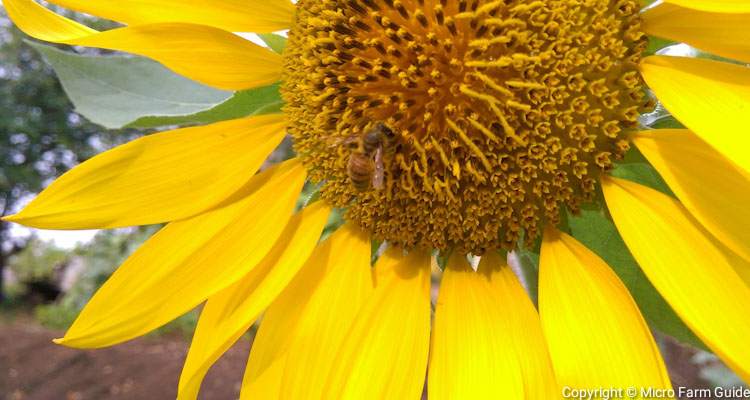
In this article, you’ll learn the best method for harvesting sunflower seeds. We have also included tips on telling when they are ready and a simple way to store your seeds so they last as long as possible.
Note: Before you start, you should have a clean, dry container ready to catch the seeds as they fall off.
What Is The Best Time To Harvest Sunflower Seeds?
As we mentioned earlier, the sunflower season ranges from July to October. However, that doesn’t mean that harvesting sunflower seeds at any time during this window will produce the same results.
The best time to harvest sunflower seeds is when you notice the back of the seed head becoming brown, and the petals are drying out and falling.
At this point, the seeds in the sunflower head are black (some varieties might have white stripes) and look plump.
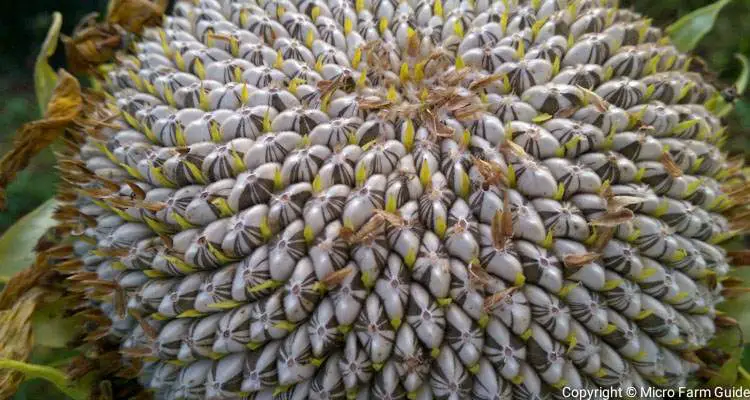
If you harvest your seeds by picking the flower heads too early, you might get more seed coats than anything else. But at the same time, if you wait too long, the seeds won’t be tender enough for roasting.
You also need to bear in mind that you’re not the only one after those sunflower seeds. Animals in your garden will want their share too, so you want to get in there before they do!
2 Methods For Harvesting Sunflower Seeds
You essentially have two options when it comes to harvesting sunflower seeds. Each method has its benefits and drawbacks.
The first method saves you time but risks the seeds drying out or animals getting to them.
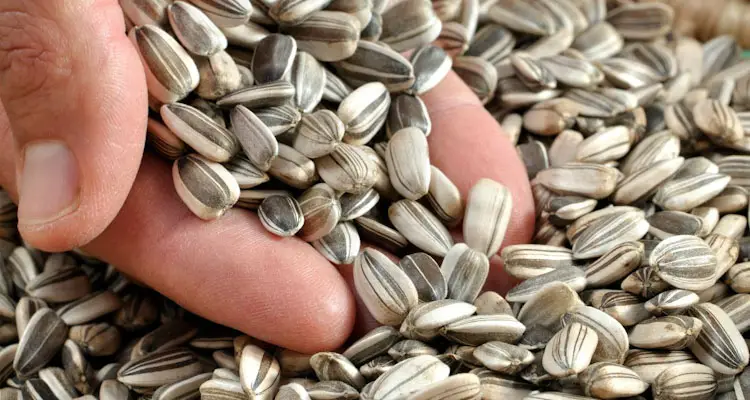
Whereas the second method improves your chances of a good harvest but increases the time, you have to wait before you can put your seeds into storage.
Method 1: Wait Until The Sunflower Seeds Have Matured Completely
If you’re going for the first method, you will need to watch and wait until you’re sure the seeds have ripened fully.
As mentioned, the seeds should look black, with white strips for particular varieties. They should be plump and start loosening from the sunflower head. The back of the sunflower’s seed head should have turned brown at this point.
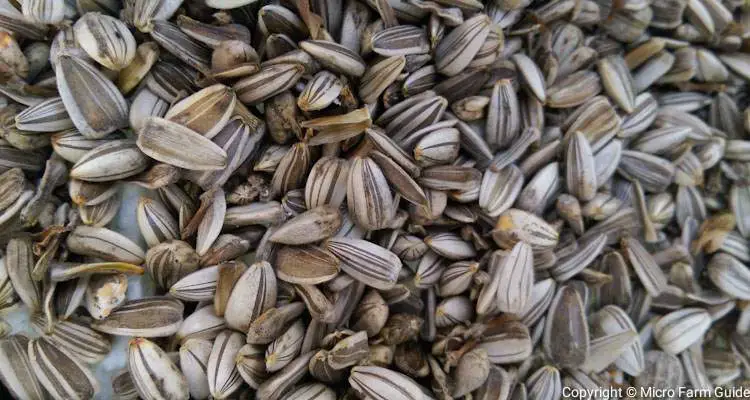
Take a pair of gardening shears and cut through the stem of your sunflower. The best place to cut is about an inch under the head.
Once the head is separated from the stem, you can start removing the seeds by rubbing them with your hand. Make sure to blow away the chaff, so it doesn’t get mixed up with your grains.
Afterward, you need to leave your seeds out to dry in a warm environment with minimal humidity and good ventilation before transferring them into an airtight container for storage.
Method 2: Harvest Sunflower Seeds After The Majority Have Matured
Method 2 starts off similarly to method 1 because you also need to cut the head off the sunflower’s stem first. Make sure at least 2 thirds of your sunflower seeds are ripe before you harvest though.
However, for this method, you’ll want to leave more of the stem on the head. We recommend cutting about 3 or 4 inches from the seed head for the best results because you’ll need a piece of the stalk to hang the sunflower heads out to dry later.
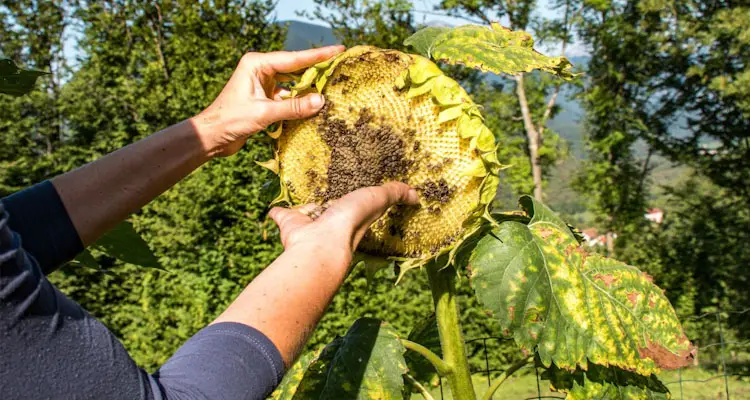
Afterward, wrap the head of the sunflower in a paper bag, taking care not to disturb the seeds as you do so. Then, use a string to tie around the stems of your sunflower heads and hang them upside down to dry.
Again, the drying space should be warm and well-ventilated. If you’re using this method, it will probably take a few weeks for your seeds to dry.
This is ideal if you don’t want to risk your sunflower seeds drying out or being eaten by animals before you can harvest them.
How To Store Sunflower Seeds Properly
If you’re using your sunflower seeds for cooking purposes, you may wish to use them up right away or, for the very least, within a short period.
However, if you don’t want to use them straight away, you’ll need to ensure they’re as dry as possible before storing them because this helps them keep them longer.
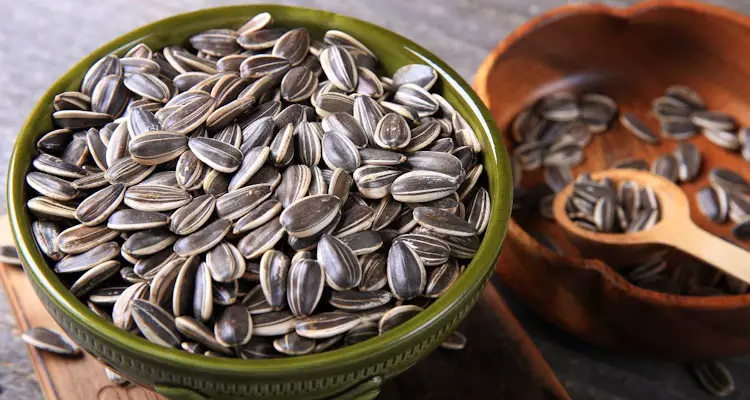
You can add silica gel, rice, or tissue-wrapped powdered milk to your storage container to extend the shelf life of your seeds.
Place your dry seeds in an airtight container, such as a sealed mason jar with a dated label, and put the container in a dark, cool place, such as a cupboard.
However, it would be best to put the container in the refrigerator for long-term storage. This will allow you to keep the seeds viable for years to come.
Final Thoughts
You can either harvest sunflower seeds when they have fully ripened or when 2 thirds of the seeds have ripened.
For the latter method, you’ll need to cut further away from the head (at least 3 inches instead of 1) and allow a few weeks for the seed heads to hang upside down and dry out.
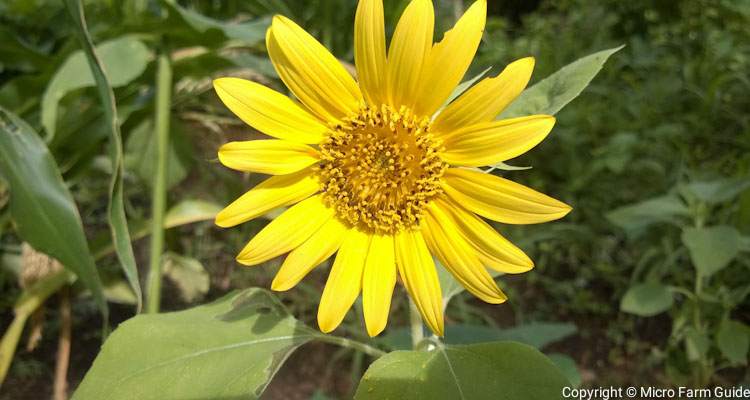
It’s ultimately up to you to make an informed decision based on the weather and your observations of the sunflowers in your garden.
Either way, store your seeds in an airtight container in the fridge or freezer if you intend to keep them for a long time.
References
University Of Georgia Extension. Growing Sunflowers In The Home Garden. extension.uga.edu. Accessed October 2022
San Diego State University Extension. Harvesting Sunflowers. [PDF] Accessed October 2022
National Sunflower Association. Production Resource Books. sunflowernsa.com. Accessed October 2022
